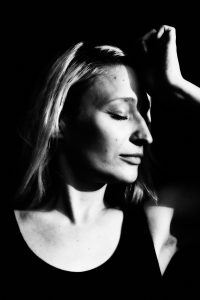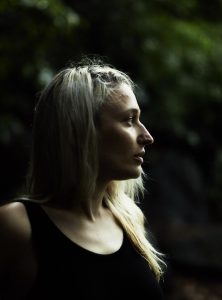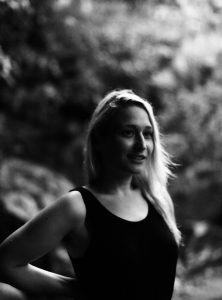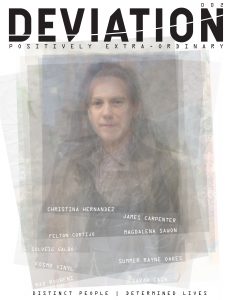Maria Neckam: The Silence of Sound

Photo by Chris Keohane
By Ash Hoden
It’s been called different things by different people. Winston Churchill had his “wilderness years” and John Lennon had his “lost weekend.” Dylan disappeared for awhile, but as with all things Dylan, it’s hard to put a label on what that was all about. Churchill returned to political life to become an iconic World War II figure, Lennon’s lost weekend was actually a hugely productive eighteen months of solo and collaborative output, and Dylan emerged to write Blood on the Tracks following his first tour after nearly eight years of reclusion. Singer and musician Maria Neckam is returning from her own self-imposed exile, arriving with a new sound and a new approach.
Maria was raised in a small town outside of Vienna, Austria. As a child she sang in a children’s choir and during adolescence she had a band, playing piano and guitar and writing her own songs. But in rural Austria the idea of being a professional musician was a little far-fetched. “It was great in a lot of ways but I wasn’t surrounded by artists. So when it came to me wanting to pursue that I didn’t get a lot of support at first. People would just make music on the side and then study something real, you know.” Despite that, it was a series of high school aptitude tests that confirmed her intention to study music.
She studied jazz in Amsterdam, which was like learning a new language in some respects. Particularly having to name the notes being played. “It was so foreign to me because I always just loved to sing. I could sing it, but you can do that by ear. And in music school that’s a big thing. But, yeah, I got over it. I really did like it in jazz — just the idea of the freedom you have, the improvisation and all these different things you can do and try.”
In addition to jazz Maria also studied Indian music, taking voice lessons on the side. “It was very inspiring in terms of composing and also improvising. Good ear training too because Indian singers sing on note names.” She was also playing gigs at local clubs and touring with a band she formed with fellow music students. They released an album and then she came to New York, finishing her education at the Manhattan School of Music. But prior to making the move she needed to earn some extra money, knowing about the expense of living in the city. “I ended up working at this supermarket where almost everybody was an immigrant. Morocoo or Turkey or Suriname. I loved that, because [at] closing time they would turn on this really loud Arabic music. I loved it! It was cool to get to know people that have a totally different background, totally different reality, totally different mentality — just a totally different culture. Very open and welcoming, and just enjoying life. Yeah, that was really cool.”
When she arrived in New York she plugged directly into its jazz scene. “People are very open here and welcoming. That’s the cool thing about jazz, you can easily do that. And I think I brought something to the table that was different and people really liked that. My voice has a particular sound that you don’t hear that much. Also, because I studied Indian music and I’d studied improvisation, I was comfortable improvising and just kind of moving in the music.”
Her first years in the city were all music, going to shows every night and playing as often as she could. Leading up to the end of this period, however, her focus began to shift. In the midst of these swirling undercurrents she and her boyfriend/bandmate parted ways and everything cut loose. “It already had started before, but it’s like, ‘Wait a minute. What about living? Like what normal people do; think of other things than where can I play my next gig or where can I tour.’ I thought a lot about what’s important to me in life and what I want and, I realized in terms of music too, that I had finished a certain period of my artistic endeavors, or something. I had explored this certain area of music for now and I wanted to focus on songs — writing songs that speak to people on an emotional level and not necessarily on an intellectual level.” It had all exploded at once. Pop.

Photo by Chris Keohane
“I kind of retreated from that whole thing and just wanted to focus on myself. So I naturally stopped going to certain shows and I stopped doing any music business stuff because I was just soooo fed up with it. And then I had this new apartment and I had no reception in the apartment. I felt like I was in a cave you know, disconnected. So I started writing songs again — just for myself. I was just at home writing songs. And yeah they changed. The style changed.”
What did you do outside of that, if not going out and celebrating?
“Well at first I was going out a lot and getting drunk a lot. And then it got [to be] a little much. I woke up on New Years Day and I was like, ‘What the hell am I doing with my life?’ And also I had a little transition period where I moved and I didn’t want to have roommates anymore, but I didn’t make enough money to live on my own. So I was frantically looking for more students. Then all of a sudden I was teaching a lot.”
These are Maria’s quiet years. Her time to regroup and redirect. Although it wasn’t a new practice for her, Buddhism played an integral role in this process. “I started practicing Buddhism a year after I moved here, and that really changed me. Gradually, and then at some point, boom. I practice Nichiren Buddhism with the SGI (Soka Gakkai International). It’s a very modern Buddhism, so there’s no priests or anything. I love that about it. You don’t have to change who you are at all. And it’s a practice. I do it every morning and evening. We chant, we don’t meditate, although that has a meditative quality. It’s kind of like a meditation on sound, I would say. It’s easy to start because immediately you feel better. But then you kind of stir up your life so all of the crap comes out too.”
Sounds like it’s not based on the hardline approach of removal of desire.
“There’s a concept: earthly desires are enlightenment. Basically as a human being you are always going to have desires, but you can use those desires for something positive — to create value. And sometimes what you want changes too. And sometimes you get it in a way that creates value for not only yourself, but for everyone around you. It’s amazing. I actually first encountered it in Amsterdam through my Indian singing teacher. I tried it a little bit and it felt good, but it still felt too foreign. I wasn’t really ready. But this way of looking at life, it all just makes sense. It’s kind of what I already thought anyway.”
I’m sure that has a big impact on how you work.
“And just having the courage to be yourself, because it took a lot of courage for me to change my musical style. I had already built something and it would have been so much easier to continue that.”
Buddhism also affected Maria’s approach to teaching music. “I didn’t really go in with a great attitude to teaching. I was just like, ‘Okay I’m doing this for money and when can I stop doing this?’ At some point I just became so dark. And then in Buddhism there was something I read [about] how you should always do your best wherever you are, you know. And I was like, ‘Damn, I think I really need to apply that.’ Then I started actually making an effort and all of a sudden it became so much more fun and rewarding. For awhile a whole bunch of my students would greet me with, ‘I hate piano.’ Like kids. And they’d just kick and scream and didn’t want to do it. And now sometimes they’re like, ‘I love this song.’ Teaching has been really inspiring with music too, because sometimes I get ideas from whatever they do and what I’m teaching them.”
This time away from the music scene was not easy, either. Maria still had to pay bills and survive in the city while no longer playing as many paid gigs. But these challenges fed her creativity. “I think it’s good to have some kind of struggle because the people that don’t have any struggle, I think it prevents you from actually really developing yourself. A lot of the times. Because you don’t have to. When you have to work hard for what you do — like, say you have to do shitty jobs you don’t want to do — then you really appreciate the time you have for your music. It makes you reflect over and over again why you are doing that. It’s because that’s what I believe in and that’s what I love and that’s what I’m best at. You’re reconfirming it and you’re becoming stronger in your determination.”
I think there’s a lot of life essence that comes out of it as well. Just having to do a job you don’t want to do, it gives you things that you can use in your work. You relate to the struggle of life.
“Totally. I remember at some point I had to babysit, and I was never that kind of girl that was into kids. I was at first like, ‘Argh, I don’t know what to do with these kids.’ I got this job in the summer where five days a week I would pick up this kid every afternoon from his camp and then, like, do something. After awhile we got along really well, and there was this weird moment where I was in the zoo with him and I was running with the stroller and all of a sudden I felt this happiness. It was really weird. I felt like, ‘Yeah I could be happy doing this.’ That was such a sense of freedom because I realized that you could be happy with whatever you do. Sometimes when you pursue art there is a lot of ego and you attach your value as a human being to your success, and that can be really painful. Sometimes things go well and you feel great. And then they don’t and you feel like you’re a failure, you know. But that was really great to feel like, ’Oh, ok, it doesn’t really matter that much.’”

Photo by Chris Keohane
It was when she got an invitation to play with a band at the Winter Jazz Fest that she began to contemplate putting out new music and getting back into performing on a regular basis. There she ran into a number of her old friends, one of whom was Jon Cowherd. He was playing with Meshell Ndegeocello. Seeing one of her jazz friends playing something other than jazz made her realize that she was sleeping on a golden opportunity. Simply because she was going in a new direction didn’t necessarily mean that she had to entirely disconnect from her past ties. She was sitting on a body of new work and she knew the right people to help her bring it out. In the past she had recommended Cowherd as a producer to several other musicians, but she had never herself worked with a producer. “For a long time I never even considered it. I was like, ‘I don’t know what they can do that I can’t?’ In one way I was lucky because I had a certain stubbornness in terms of not letting people mess with my style. But then at some point I realized that it also harmed me too, because there were certain comments I had gotten that I had disregarded. And now I’m looking back… It was good advice and I was a little too proud to see it.”
With Cowherd’s assistance she put together a new band and selected the songs and arrangements for a new album. Departing from her previous, more technical body of jazz compositions, it will be a collection of grittier, emotionally resonant indie rock tunes. It is the end of Maria’s exile, affirming that a little bit of silence can go a long way in the pursuit of a new sound.
Get Deviation Issue 002 (Print or Digital)
[fbcomments width="100%" num="10" ]



